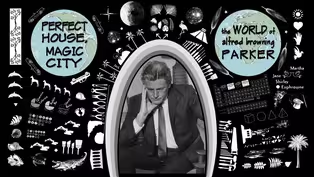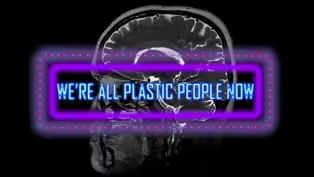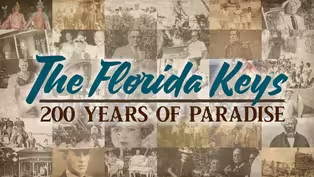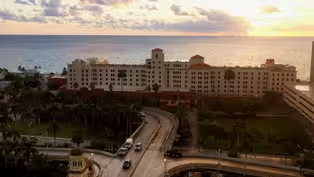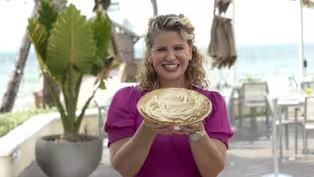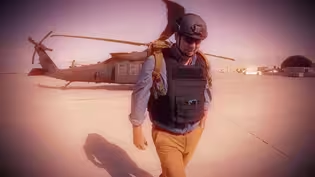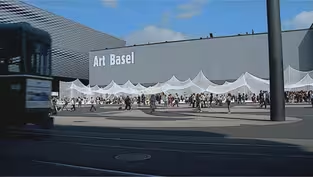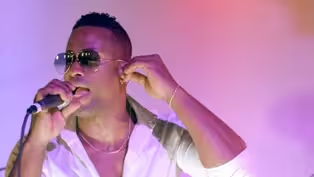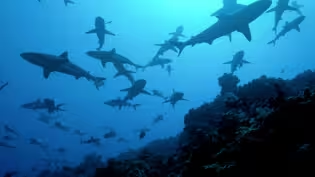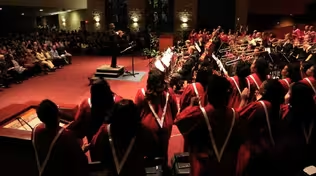South Florida PBS Presents
Fauci: The Virus Hunter
Special | 56m 26sVideo has Closed Captions
Explore Dr. Anthony Fauci's unique legacy in infectious diseases research.
Explore the life and career of the nation's top infectious diseases expert Dr. Anthony Fauci, who's helped seven U.S. presidents confront public health crises by promoting facts over fear.
Problems playing video? | Closed Captioning Feedback
Problems playing video? | Closed Captioning Feedback
South Florida PBS Presents is a local public television program presented by WPBT
South Florida PBS Presents
Fauci: The Virus Hunter
Special | 56m 26sVideo has Closed Captions
Explore the life and career of the nation's top infectious diseases expert Dr. Anthony Fauci, who's helped seven U.S. presidents confront public health crises by promoting facts over fear.
Problems playing video? | Closed Captioning Feedback
How to Watch South Florida PBS Presents
South Florida PBS Presents is available to stream on pbs.org and the free PBS App, available on iPhone, Apple TV, Android TV, Android smartphones, Amazon Fire TV, Amazon Fire Tablet, Roku, Samsung Smart TV, and Vizio.
Providing Support for PBS.org
Learn Moreabout PBS online sponsorshipMore from This Collection
Documentaries showcasing the South Florida community produced by South Florida PBS.
Video has Closed Captions
A documentary portrait of architect Alfred Browning Parker. (56m 46s)
Video has Closed Captions
Investigation into the hidden story of plastic and its effects on human health. (56m 50s)
The Florida Keys: 200 Years of Paradise
Video has Closed Captions
Journey through the history of the Keys and meet the people who live there. (56m 46s)
Video has Closed Captions
The Historic Hollywood Beach Resort, also known as the "Grand Lady," has a famous and stor (26m 29s)
Video has Closed Captions
Michelle Bernstein tours the Florida Keys in search of local specialties, recipes and more (56m 46s)
Video has Closed Captions
The story of American men and women serving in our wars in the Middle East. (24m 46s)
Panama Canal: Prized Possession
Video has Closed Captions
Explore the history of the transfer of the Panama Canal from the United States to Panama. (57m 23s)
Video has Closed Captions
Basel, Switzerland plays host to the largest and most influential art fair in the world. (26m 58s)
Video has Closed Captions
Experience the explosion of the Latino influence on mainstream American music and culture. (57m 23s)
Red Dot on the Ocean: The Story of Matt Rutherford
Video has Closed Captions
Matt Rutherford risked it all in an attempt to sail alone around the Americas. (56m 50s)
Video has Closed Captions
Mysteries of the Coral Canyon tells the story of how sharks and coral reefs are connected. (55m 1s)
Video has Closed Captions
Everyone Has A Place is a short musical documentary featuring jazz, gospel and vocals. (26m 55s)
Providing Support for PBS.org
Learn Moreabout PBS online sponsorship- It kills in a high percentage and it kills quickly.
- [Narrator] He is the man who's helped navigate America through several public health crises.
He is a scientist who commands the attention of leaders around the world.
- Dr. Fauci-- - Dr. Fauci-- - Dr. Fauci-- - All I hear Dr. Fauci is we can't do this, we can't do that.
- This is a very, very unusual virus that we can't even pretend that we know everything about it that we need to know.
- [Narrator] He is the advisor who has helped seven presidents fight humanity's most virulent enemies, and drawn his fair share of critics.
- [Crowd] Fire Fauci!
Fire Fauci!
- [Narrator] How did a young Brooklyn born doctor take over the world stage?
- There are many things when you have outbreaks.
- [Narrator] In an era of shouting.
- It's the unknown.
- [Narrator] He taught.
- It's the cataclysmic nature of it.
- [Narrator] With language that people could understand.
- To get information out, because there is a lot of fear.
- [Narrator] How did Anthony Fauci become one of the planet's most prominent infectious disease doctors?
- Our patient Nina Pham is free of Ebola.
- [Narrator] Join us now, as we share the inside story of America's top pandemic expert, a savior to some, a polarizing and alarmist figure to others.
(dramatic music) (dramatic music) (soft piano music) - [Narrator] Two major health crises have book-ended Dr. Anthony Fauci's long and distinguished career, AIDS and COVID-19.
During both, he has faced scientific and political obstacles with boundless energy and a commitment to help humankind.
- Brilliant, hardworking, courageous, absolutely focused on what the data from any experiment tells him.
Nonpolitical, the consummate scientist.
- [Narrator] Yet with all of his experience not even Fauci could predict what was ahead.
- I don't think this is something that the United States public should be worried or frightened about, but they should know that we are taking this obviously very seriously as it evolves.
(lively music) - [Narrator] Fauci's friends and colleagues say, it's his childhood roots in New York City that molded him into what he has become today.
- He could talk to anybody and I think he learned that from his background growing up in Brooklyn, and he also learned an incredibly strong sense of family and what it means to be close.
(gentle guitar music) - [Narrator] Anthony Stephen Fauci was born in Brooklyn on December 24th, 1940, growing up in the years following World War II.
His father, Stephen, graduated with a degree in pharmacy from Columbia University.
His mother, Eugenia, went to Brooklyn College and Hunter College.
The Fauci Pharmacy was a family effort.
They lived in an apartment above the pharmacy.
His mother and older sister, Denise, ran the cash register, Fauci handled deliveries.
- When Tony learned how to ride a bicycle he was delivering drugs early in his life to the people who went to the pharmacy.
So he was indoctrinated into healthcare at a very, very early age.
- [Narrator] The Fauci children attended Catholic schools.
Anthony took a bus and three subway trains daily just to get to Regis High School, a prestigious Jesuit school in Manhattan.
His schooling would have a lifelong impact on his career choices.
- Dr. Fauci went to high school and to an undergraduate college that was focused on the humanities, on ethics, on history, on literature.
And before he ever got into medicine, he had thought about all of these ethical questions that become extremely important for a physician as he has to make life and death decisions.
- [Narrator] But before medicine, his biggest interest was sports.
(upbeat music) - He was a very good basketball player and was even captain of the basketball team.
He loved basketball, but unfortunately he had a congenital abnormality.
He was short (chuckles), so he couldn't play basketball beyond high school.
And in the summers he worked on construction crews in Manhattan.
And one of those crews was working on some construction outside the New York Hospital, Cornell Medical School, and he went into the classroom, or the place where grand rounds were held at Cornell, and was awed just by being in that empty room.
And he met a policeman who told him he had to leave because he had his construction boots on.
And he said to the policeman, "I'm gonna be going to medical school here."
And the policeman looked at him and said, "Yeah, and I'm gonna be head of the police force in Manhattan someday."
(upbeat music) - [Narrator] Not only did Fauci enroll in Cornell, but he graduated first in his class in 1966.
It was the height of the Vietnam War and every new physician was required to perform some type of military service.
Fauci applied and was accepted at the National Institute of Allergy and Infectious Diseases, the NIAID, at the National Institutes of Health in Bethesda, Maryland.
With the exception of returning to Cornell to complete his internship and residency in internal medicine, Fauci has been at the NIH ever since.
That's when Dr. John Gallin, a friend and colleague, met Fauci in 1972.
- He had the lab across the hall from me and it was a mess.
And I knew it was a mess.
It was dirty, pieces of equipment had been taken out of it by other investigators.
And so I happened to bump into him as he was walking into his new laboratory, and I saw this look of astonishment.
I mean, he thought it was gonna be all fresh and clean and filled with everything.
And I said, "Hey, would you like a little help?"
And he said, "Sure."
So we spent some time cleaning up the lab, and we became friends ever since then.
- [Narrator] As a senior investigator, Fauci worked alongside his mentor, the late Dr. Sheldon Wolff and Dr. Michael Osterholm.
(dramatic music) - His mentor at the NIH, Shelly Wolff, was also a mentor to me back in the early 80's as I worked on toxic shock syndrome.
And so Tony and I got to know each other way back then.
And so we've kind of shared parallel tracks.
- [Narrator] Fauci's first major contribution came when he developed an effective way to treat vasculitis or inflammation of blood vessels, which could be deadly.
- Dr. Fauci and Dr. Wolff developed, at this very early stage of his career, a treatment regimen that is now become standard of care, putting these patients in prolonged remission then curing many of these patients.
And for that, Dr. Fauci, very early in his career was recognized as an outstanding clinical investigator and an outstanding physician.
- [Narrator] While making rounds at the NIH, he met a woman who would change his life.
- [Dr. Gallin] One of the nurses on the floor was Christine Grady.
And obviously there was an attraction.
- [Narrator] The couple married in 1985 and went on to have three daughters.
Despite all the demands of work and school, family dinner was the one time of day when you could count on the Fauci's to be together.
- We got home late, maybe nine o'clock in the evening because he worked from seven in the morning 'til nine every night, every day, at least six days a week.
And she would have the family get together for dinner in the evenings.
And, you know, he just adored his children and whatever time he had, he was very dedicated to them.
- And he's like all of us that maybe spend too much time doing what is professionally important, but he's always made it a priority to carve out that time for his personal life.
(electronic music) - One of the things about Dr. Fauci that I've learned over the years, he's a phenomenal observer.
He really sees everything.
- [Narrator] Some would say it was that keen observation, that led Fauci to uncover what was about to emerge as a global epidemic.
In the early 1980s, fear and anxiety began to circulate among young gay men, like Matt Sharp.
Suddenly, friends and partners were dying with no explanation.
- It was truly frightening.
We knew that there were one by one, people like us were dying and getting sick.
And so we knew that something was coming for us.
- [Narrator] On June 5th, 1981, Fauci, then a senior investigator with the NIAID read the first report of an uncommon immune disorder among a few healthy gay men.
- I was speaking to him across the lab and he said, "This is a big deal."
I said, "How can you know it's a big deal?"
He said, "You'll see."
- [Narrator] The report said this unusual infection was spreading.
It was now seen in 26 men.
According to a second MMWR study, the CDC noted the illness among intravenous drug users a year later.
- As I've often said, it was literally the first time in my medical career that I actually got goose pimples because I knew there was something very wrong and very new here.
- [Narrator] Fauci later learned that HIV, Human Immunodeficiency Virus is a virus that attacks cells that help the body fight infection, making a person more vulnerable to other infections and diseases.
If left untreated, HIV can lead to the disease AIDS, Acquired Immunodeficiency Syndrome.
- I decided to completely change the direction of my career and walk away a bit and turf to other people the studies that I was doing on autoimmune type diseases and begin to study these unusual patients.
- Literally a few weeks time, he completely shifted the entire emphasis of his laboratory to study this new disease.
That was a very bold move.
- He was told by many senior people, "Tony, you're going to destroy your career.
You have a wonderful career in immunological research.
Why are you doing infectious diseases?"
And he said, "It's going to be an international problem.
And I'm going to work on it."
- [Narrator] At the same time, Sharp, a classically trained ballet dancer was coming to the end of his dancing career in Oklahoma City.
Like so many others, he began looking for answers.
- We started forming our own groups, our own local groups to get attention in the public and to make people aware not only in our own community but in the general community as well to let people know that something was hitting and we were scared to death.
- [Narrator] While Fauci began work at the federal level, Dr. Eric Goosby began treating patients in San Francisco, the epicenter of the AIDS crisis.
- Because of the nature of the outbreak and the populations that were at highest risk, gay men, injection drug users, early predominance and people of color.
The social reaction to that was one of, "This is not our problem.
This is happening to somebody who's not part of our tribe."
And as a result, the initial response was marginalized and poorly orchestrated really at city, state and national levels.
- [Narrator] Inaction from the Reagan administration in the beginning of the AIDS crisis, drew heavy criticism.
It wasn't until September 17, 1985, that Reagan mentioned AIDS publicly when he called the virus a top priority.
He was defending his administration against accusations that funding for AIDS research was inadequate.
In response, activists formed ACT UP, which stands for AIDS Coalition To Unleash Power.
- The US government is abandoning people with AIDS.
- [Crowd] Fight back, fair pricing now.
ACT UP, fight back, fair pricing now.
- [Narrator] Peter Staley got involved after testing positive for the HIV infection at age 24.
- We knew we were making history from the get-go and it was all about something far larger than ourselves.
It was about saving hundreds of thousands of lives and people well beyond New York City's borders.
And not just gay men, but African-American women and single moms in Harlem and IV drug users in Los Angeles and Moscow and people of color all throughout Sub-Saharan Africa.
We were ground zero for the activism that was trying to bring the world's attention to this old epidemic that had been ignored for six years.
- [Narrator] Responsible for all government-funded AIDS research, Fauci she was labeled a murderer in a published letter by the founder of ACT UP, an activist named Larry Kramer in 1988.
- Larry and Tony, it was like a really messed up marriage.
It was a love-hate relationship that's for sure.
It started with Larry even before ACT UP coming after Tony with all guns blazing in the press, calling him basically kind of a America's Hitler, allowing all these thousands of gay men to die on his watch.
- [Narrator] While the dialogue was started, the activist said progress wasn't happening.
In 1990, Fauci was the target of a major protest, Storm The NIH.
- It was a day I'll never forget with hundreds and hundreds of people living with HIV literally charging onto the campus of NIH.
- We had military smoke grenades on the top of these long poles.
And marched up to building one where his boss worked, the head of the NIH.
That's how the day started in a rainbow of multicolored smoke pouring up to building one, almost freaking out the police.
And then we shifted over to building 31, which is his building where NIAID is based.
And as we moved over there, I wanted to be the first one arrested.
- [Narrator] Two months following that protest, Staley said Fauci was finally able to convince other NIH scientists to allow AIDS patients to join and have a say in the AIDS clinical trials group, the ACTG.
- He wasn't a perfect leader of AIDS research.
That said, none of us ever doubted his commitment.
He really wanted to solve this problem.
And he worked it relentlessly.
He made some mistakes that we identified that definitely costs lives.
If you're in a position like that where you're leading a country's research effort into a disease, you are going to make some mistakes that cost lives, there's just no way around it.
- [Narrator] Fauci fought the US Food and Drug Administration, the FDA to speed up the process to get AIDS drugs readily available to patients.
Fauci went on to lobby Congress for increased government funding for AIDS drugs, research and education year after year, completely turning around the relationship with AIDS activists like Larry Kramer.
- When Larry died a month into COVID, the busiest time of Tony's life, I was the one to break the news to him and it caught us both off guard that it happened at that moment with this new plague upon us.
And we both shared some tears on the phone together.
It was rough.
He really did love Larry and it broke his heart.
- [Narrator] Kramer died of pneumonia at 84.
Since the first cases of HIV were noted in 1981, 78 million people have become infected with HIV and 35 million have died from AIDS-related illnesses according to UNAIDS.
(soft guitar music) - The end is indeed in sight, but there is a lot that we still need to do to get to that end.
Over the 35 years of science at NIH in medical centers throughout the world, there has been nothing short of breathtaking scientific advances over a relatively brief period.
- [Narrator] Fauci says the treatments available for AIDS patients now brings the detectable virus to a level that makes it almost impossible for that person to infect someone else.
- [Dr. Fauci] Within the scope of a single generation we have the opportunity to do something that historically when you look back at it, polio, measles, smallpox, we have the opportunity of being the generation that was there when the disease was first recognized.
And if we properly follow the science and implement it, we could be there when the disease ended, that has never before been done in the history of medicine.
- [Narrator] Diagnosed with AIDS in 1988, Sharp credits Fauci with his own long-term survival.
- If I had not fought as hard as I did the way I did in my own way, I wouldn't be here today.
(soft guitar music) (soft violin music) - Tony is really a leader that is hard to define in just a sentence or two, but you know it when you see it, because whether it's dealing with the highest levels of government, it's dealing with science colleagues who are extremely bright.
It's when he's dealing with the Congress persons on the Hill, it's when he is in the media talking to a reporter.
That's how he responds when he's on a webinar and answering questions for students.
I think all of those are the different sides of Tony, which are many.
And I think that's what makes him such a unique gift to public health and to the overall issue of infectious diseases today.
(soft violin music) - [Narrator] When SARS or Severe Acute Respiratory Syndrome emerged in 2003, Fauci and his team shifted their focus to this emerging disease.
- How does this microbe cause it's pathological effect, the genesis of the pathology.
And that's what we're gonna be studying very intensively now that we have the virus.
- [Narrator] SARS affected more than 8,000 people worldwide, and was responsible for over 700 deaths.
In 2005, the United States prepared for bird flu, even though there were no cases reported domestically.
- There should be...
The awareness should spur preparedness but should not spur panic, which unfortunately happens sometimes when people hear a lot of information being disseminated about what's going on in preparedness, they assume therefore that the worse-case scenario will occur which is certainly not necessarily the case.
(dramatic music) - [Narrator] The H1N1 or swine flu was named the pandemic in June, 2009 by the World Health Organization.
With global public health at stake, clinical trials began quickly.
- The National Institute of Allergy and Infectious Diseases at NIH, which is a part of HHS is currently implementing a series of vaccine trials testing 2009 H1N1 influenza vaccines in various populations, including adults, the elderly, children and pregnant women among others.
- By November, 2009, the WHO set around 3 billion doses of the vaccine were produced for worldwide use.
Looming in March, 2014 was the next deadly viral disease.
The WHO reported cases of Ebola in a forested rural region of Guinea.
Scientists believe outbreaks began when the virus was transmitted from bats to other wild animals.
People became infected from handling or eating the animals.
Ebola is contagious only when a patient has symptoms.
And it is spread through direct contact with bodily fluids.
Thomas Eric Duncan was the Liberian citizen who became the first Ebola patient diagnosed in the United States on September 30, 2014.
Duncan was visiting family in Texas when he got sick.
He was treated at Texas Health Presbyterian Hospital in Dallas, where he died on October 8, 2014.
Two of Duncan's nurses, Nina Pham and Amber Vinson were both infected with Ebola.
Nina Pham was initially treated in Texas, but was later flown to the NIH Clinical Center under the care of Fauci and his team.
- Nina put herself in a situation where she knew it was a risk, but because of her character and her bravery and that of her colleagues in the field, she happened to unfortunately get infected.
That's a different story from the general public.
She was with a very sick person.
- [Narrator] After her care at the NIH, Pham recovered from the virus.
- Our patient Nina Pham is free of Ebola virus.
- [Narrator] Nurse Pham was cleared to go home to Dallas.
It would be three years later that the FDA would approve ERVEBO, a vaccine for Ebola.
In 2016, the WHO declared Zika, a public health emergency.
The Zika virus diseases spread to people primarily through the bite of an infected mosquito.
And the Americas were especially hard hit.
- We really do need to learn a lot more because this is a very, very unusual virus that we can't even pretend that we know everything about it that we need to know.
- [Narrator] What Fauci learned together with the CDC, is that some pregnant women who got infected with Zika have a complication that has passed onto their child called microcephaly, an issue with the development of the fetal brain.
Congress agreed to allocate $1.1 billion to help fight the spread and effects of the Zika virus.
- In a briefing by Dr. Fauci at the NIH, the good news is is that we feel fairly confident that we can develop a effective vaccine for Zika.
And that would help a whole lot of people and allow us to get out in front of this problem before it's in the continental United States.
- [Narrator] In the time that the virus was active, the research community made quick strides in developing diagnostic tests and vaccine candidates but the epidemic trailed off a few months later.
(soft piano music) - Tony Fauci is a master at taking complex scientific ideas, constructs and translating them into the policy implications for a political brain to understand and to be able to prioritize and make an allocation decision to support it.
He has done that over and over and over again with each President and their senior leadership.
And it's not something you can teach people.
It's something that you just have this innate ability with.
- [Narrator] Fauci has worked as a key advisor on national health crises under seven administrations, President's Reagan, Bush Sr, Clinton, Bush Jr, Obama, Trump, and Biden.
- Because he's apolitical, he's been able to interface with presidents on both sides of the aisle because he is such a clear thinker and so gifted at being able to present complicated issues in very simple terms and advising people as to what directions they should pursue to help the public good.
They trust him and they ask him to come back and they ask him to come back again and again.
- But I can tell you we got a very good headstart-- - [Narrator] Fauci has also testified before Congress more than 200 times.
- When Congress has him testify at hearings they understand that he knows what he's talking about.
There's no baloney.
He has no agenda other than improving health and helping to take care of the patients.
The patient, meaning be the entire country or the entire world.
(soft piano music) - [Narrator] Fauci has said he had a very close personal relationship with the late President George H. W. Bush, who took an interest in learning about HIV while still Vice-President.
- [Announcer] Vice-President George Bush.
- [Narrator] During the 1988 Presidential Debate between Bush and Michael Dukakis, the candidates were asked to name American heroes who could inspire this country.
Bush said, "I think of Dr. Fauci, probably never heard of him.
He's a very fine research, top doctor at National Institutes of Health, working hard, doing something about research on this disease of AIDS."
In speeches, Fauci said, every administration gave substantial support to the AIDS effort and called President Clinton and Hillary Clinton, then Secretary of State in this photo, extraordinary allies.
Fauci got to know President George W. Bush amid the crises of 9/11 and the 2001 anthrax attacks.
Bush sent him to Africa in 2002 to explore ways to bring drugs and treatment for AIDS in developing countries.
Fauci came back with PEPFAR.
The President's Emergency Plan For AIDS Relief in 2003.
- PEPFAR was by far the largest funding mechanism to address AIDS in the world and saved countless lives in Africa and in other places.
- I think PEPFAR is probably the most important legacy of this country in global public health.
- [Narrator] In 2008, Bush awarded Fauci, the Presidential Medal of Freedom for his work against HIV and AIDS.
The award recognizes outstanding leaders in their chosen fields who have made meritorious contributions to our nation and world.
- Well, it's an extraordinary experience and an extraordinary honor.
It's actually quite humbling when you think of the fact that your life's work has been publicly honored by the President of the United States.
(dramatic music) - [Narrator] The ability to fly anywhere in the world within 24 hours is an amazing feat of progress.
But access to global travel makes the spread of a virus very easy.
The novel coronavirus that causes COVID-19 was to become a public health threat like no other.
- I think in that regard this is a challenge that we've not seen in a hundred years.
- [Narrator] The coronavirus surfaced in a Chinese seafood and poultry market late in 2019.
On December 31st, the government in Wuhan China confirmed that health authorities were treating dozens of cases of a viral pneumonia.
On January 9th, 2020, the World Health Organization, the WHO notes a mysterious virus.
Initial reports pointed to a coronavirus as a possible pathogen causing the cluster.
On January 17th, the US begins screening travelers for coronavirus at the three major airports with flights between Wuhan and the US.
- It first really attracted my attention around January 21st and 22nd when I was at the NIH for a conference about research on modified pathogens.
So a lot of coronavirus virologists and a lot of flu virologists were there, and everybody was talking about it.
- [Narrator] On January 23rd, Wuhan put 11 million people under quarantine, suspending all public transportation and air travel in and out of the city.
A US shutdown did not appear to be on Fauci's radar when he spoke to reporters on January 20th.
- I don't think we possibly we could do it in the United States.
I can't imagine shutting down New York or Los Angeles.
- [Narrator] On January 21st, the CDC confirms the first case of coronavirus in the US.
It was a Washington state resident who had traveled to Wuhan.
At the World Economic Forum in Switzerland on January 22nd President Trump said, "The coronavirus is totally under control," in a published interview.
- You know, this virus was spreading very much under the radar across this country.
As you had a president going out there and telling the American people, this is not something you need to worry about.
We have this under control.
There are no cases here.
It's something that other people have to deal with, but not us.
- [Narrator] Trump appointed Fauci to the President's Coronavirus Task Force on January 29th, along with Dr. Deborah Birx to provide daily briefings on the pandemic.
On January 30th, the WHO declares a public health emergency.
Person-to-person transmission is quickly spreading in the US, Germany, Japan, Vietnam, and Taiwan.
And on February 11th, the disease gets a name COVID-19 or Coronavirus disease 2019.
On February 12th, the CDC announces the tests it sent the public labs are unreliable.
Trump says, there's no need to panic.
- We have a very small number of people in the country right now with it, it's like around 12.
Many of them are getting better.
Some are fully recovered already.
So we're in very good shape.
- [Narrator] Meanwhile, on February 25th, Nancy Messennior, a high ranking CDC official called for practical measures that would limit exposure to the virus, including closing schools, social distancing, teleconferencing, and delaying elective surgeries.
On March 8th, Italy locked down 16 million people, a quarter of its population.
Fauci warned elderly and those who have underlying conditions to limit their exposure to travel and large crowds.
- When we started seeing it go to Italy and Iran and South Korea, I became very concerned that this was gonna spread globally and this was gonna be a major problem.
- [Narrator] On March 12th, one day after the WHO declared the novel coronavirus outbreak to be a pandemic, Fauci found himself under pressure to answer as to why there aren't enough COVID tests available.
- The system is not really geared to what we need right now.
What you are asking for, that is a failing.
- A failing.
- Yes, it is a failing.
Now let's admit it.
- [Narrator] Fauci also came under fire for initially telling people not to wear masks.
- Dr. Fauci has always based what he says about a disease on the data he's getting.
Much has been made about the fact that early on, he said, we don't need to wear masks.
That was based on the first data that were coming in and the worry that medical personnel would not have enough masks to deal with people.
- What should he have told people, that we don't know and that we don't think it will act like the COVID viruses as we know would have been him making it up.
A scientist takes information and incorporates it in their current thinking and is open to a change in it.
That's how we advance.
That's all that you saw there.
- [Narrator] Acting couple Tom Hanks and Rita Wilson were among the first celebrities to announce they caught the virus while traveling for work.
A long list of famous names would soon follow.
- I see it as a virus that spreads when people are not aware that they're infected.
I see it as a virus that tends to spread fairly quickly after people become infected.
So there's not a long delay.
And those two features make it particularly challenging to control.
- [Narrator] New York City was an early epicenter of the COVID-19 pandemic in the US.
From March to May, 2020, the frightening images were not lost on 46 year old Diana Berrent of long Island.
- I went to a meeting on the evening of March 9th in Great Neck, New York, where a couple of the people at that meeting had been at a conference in New York City which ended up being one of the first super spreader events in the United States.
I woke up on Friday the 13th, March 13th, 2020 with 103 fever.
I hadn't had a fever in over a decade.
I felt like I had an elephant sitting on my chest.
I had this tremendous pressure on my chest that I had never experienced before.
Everyone at the meeting was infected and one person died three weeks later.
- [Narrator] On March 13th, the same day Berrent woke up sick, President Trump declared coronavirus a national emergency freeing up $50 billion in federal funds to states.
- What you're seeing now with this order is that we're gonna be able to remove the constraints so that people at the state, the local level, the individual physician, all the way up through the federal government will have as many constraints as possible removed for them to do everything they possibly can so that we can implement the things that we've been talking about.
The containment, the mitigation.
- On day 11 of being-- - [Narrator] After testing positive, Berrent began a video diary of her at-home quarantine.
- Yesterday was a really good day until it ended up not being as great.
And not feeling so great this morning.
My stomach's really, really bothering me.
And you'll see these bags up here, when those numbers start to rise you'll see them fill with the plasma.
- [Narrator] Berrent began to participate in the medical and scientific research efforts on COVID-19 and attracted the attention of Fauci.
What do you make of this virus that is wreaking havoc on every organ in the system?
- Well, I think what you have just expressed is important because it really is now making it quite clear that we do not know as much about this virus that we have to know, particularly that the symptoms that you're talking about are real.
These are not imaginary.
- [Narrator] In the task force briefings in the White House tension between Trump and Fauci began to mount.
A reporter asked, if a drug to treat malaria called hydroxychloroquine could be used to prevent COVID-19 as Trump had suggested a day earlier.
- The answer is no.
It was not done in a controlled clinical trial, so you really can make any definitive statement about it.
- He had a difficult balancing act that he had to play here because, you know, as much as he was somebody who could be trusted just to stand out and share the hard truth with the American public, he also had to be careful not to too dramatically cross the president.
- I first heard about the coronavirus in January.
And I remember talking to my classmates saying, "Wow, this seems like this is really serious."
- [Narrator] It was about five months later that the virus would have a direct impact on Kristin Urquiza.
On May 15th, Arizona's governor lifted the Stay at Home Order and allowed businesses to reopen following CDC's safety precautions.
- I think that he most likely picked it up at his favorite karaoke lounge, where he went to go celebrate being on the other side of the pandemic.
My dad woke up on June 11th with a fever, a cough and extreme exhaustion.
We were able to get an appointment at his doctor the next day, but we never got those test results back.
And we had to take him to the hospital where he was tested a couple of days later again with the rapid test and confirm that he did have the virus.
He eventually ended up continuing to deteriorate and had multiple organ failure and passed away alone with a nurse there holding his hand.
My dad did not deserve that.
He did not have dignity in his death.
- [Narrator] As many stories like that of Kristin Urquiza's family unfolded, Fauci warned in late June the consequences of not social distancing.
- If you look at what's going on and just look at some of the film clips that you've seen of people congregating often without masks, of being in crowds and jumping over and avoiding and not paying attention to the guidelines that we very carefully put out, we are gonna continue to be in a lot of trouble and there's gonna be a lot of hurt if that does not stop.
- In so many ways this virus played out very differently in different parts of the country, depending on your political leanings, where you had, you know folks in some places very much locked down for months, their lives completely upended and changed.
And then other people who seem to be sort of going about life as it was in pre-pandemic times.
- [Narrator] Fauci was seen less on coronavirus briefings at the White House.
He continued to share messages through television and social media.
With election year politics heating up, Fauci faced tough questions from Senator Rand Paul.
- Do you have any second thoughts about your mitigation recommendations considering the evidence that despite all of the things we've done in the US, our death rate is essentially worse than Sweden, equivalent to the less developed world that is unable to do any of the things that you've been promoting.
Do you have any second thoughts?
Are you willing to look at the data that countries that did very little actually have a lower death rate to the United States?
- Hopefully, and I am, and my colleagues are humble enough and modest enough to realize that as new data comes you make different recommendations, but I don't regret saying that the only way we could have really stopped the explosion of infection was by essentially...
I want to say shutting down.
I mean, essentially having the physical separation and the kinds of recommendations that we've made.
- [Narrator] As coronavirus deaths in the US surpassed 213,000, and cases on the upswing in 31 states, a September 26th White House event for Supreme Court nominee, Amy Coney Barrett was labeled the superspreader.
President Trump tweeted on October 2nd that he and the first lady tested positive for COVID-19.
At least 11 others in the Trump administration were also infected.
- I should say it was not done according to what I would have recommended.
I mean, what you saw there in the White House, I don't know if you saw that picture from above of everybody crowded together with no masks.
- [Narrator] Until the fall, the pandemics impact on the American Midwest had been less severe than other regions, but that changed between September and November.
Many countries experienced the second and third wave of COVID cases in November, 2020, bringing a fresh wave of lockdowns in countries like France and the United Kingdom.
Hospital systems were once again pushed to the brink, when the global death toll reached over 1.4 million deaths, according to the WHO.
- It has taken an enormous medical toll.
It has stretched our healthcare system, not only because large numbers of people are getting very sick and dying, but because those people need hospital resources and many other parts of healthcare have had to be postponed or put on hold because of the need to respond.
- [Narrator] Two days before the 2020 Presidential Election, emotions were running high.
[Crowd] Fire Fauci!
Fire Fauci!
Fire Fauci!
Fire Fauci!
- [President Trump] Don't tell anybody, but let me wait till a little bit after the election.
- The president certainly talked about firing Fauci.
It was something that was sort of a hot topic of conversation among some of his advisers.
But the president, you know, according to my reporting and and other folks reporting at the time indicated that the president really knew that there would be a very steep political cost for firing Fauci.
- We are in a very, very difficult situation.
It's quite problematic.
I have said that publicly many times, not to scare people but to bring a reality check to where we are.
If you look at it, we have 10 million infections in the United States, almost 250,000 deaths.
We've had 60,000 hospitalizations.
And now last count we had 143,000 infections in a single day.
- [Narrator] Not everyone agreed with what Fauci had to say.
His family received death threats, and he was assigned a security detail.
(suspenseful music) While cases were climbing, vaccine development was accelerating at a record pace in a government program called Operation Warp Speed, started in May, 2020.
In mid-December, the FDA issued emergency use authorizations a week apart for two COVID-19 vaccines, Pfizer-BioNTech and Moderna, both requiring two doses for maximum effectiveness.
Fauci received his first dose on December 22nd.
- What we're seeing now is the culmination of years of research, which have led to a phenomenon that has truly been unprecedented.
- [Narrator] The Trump administration promised to provide states with enough vaccine for 20 million people in December and fell somewhat short as states struggled to get shots into people's arms.
- Slow starts are not uncommon when you have a brand new program that you're starting to get off the ground in all fairness.
And also, it was launched right in the middle of the holiday season of Christmas and New Year's, in which many of the clinics were not at full operational capacity during that time.
- [Narrator] In early January, 2021, with over 21 million COVID cases confirmed and over 350,000 deaths in just the US, Fauci said Biden's goal of vaccinating 1 million people a day is possible having lived through the smallpox outbreak in 1947.
- An American was on vacation in Mexico and brought back smallpox to New York City.
And there were 12 cases, hospitalizations, and two deaths.
The city of New York, one city, vaccinated 6 million 350,000 people in three weeks, 5 million of them in two weeks.
One of them was me as a six year old boy, (chuckles) who got vaccinated.
So if a single city in this country can do 5 million in a week, I think the United States of America as a country can do a million in a day.
- [Narrator] With the vaccine distribution underway, Fauci was cautiously optimistic about the year ahead.
- I don't think we can abandon completely our public health measures, but I think we'll be very, very close to approaching some form of normality if we get that 70 to 85% of the people vaccinated by the end of the second quarter, the beginning of the third quarter.
(upbeat music) - [Narrator] The COVID-19 pandemic put Fauci's face in front of the world.
The Fauci following led to a long list of items for sale.
Like the Fouch on the Couch pillow, Fauci bobbleheads, t-shirts, and much more.
- When the pandemic began, we had a couple of beers in process that ended up not being able to go to their planned destination.
So we came out with a beer we were working on we changed the name of that one to kind of give a shout out to Dr. Anthony Fauci.
We called it Fauci Spring, and people kind of freaked out about this one.
So we're making a bunch more right now.
- Dr. Fauci has certainly, you know, emerged from this as a celebrity of sorts.
He's probably one of the most recognizable government officials at this point.
And he was very much sort of heralded as a folk hero.
- How many physicians and scientists and public health people have baseball cards and bobblehead dolls.
They're kind of silly, but they are a statement about what the world thinks of him.
- You know, there's very few people in this world that can go into a discipline, a large one at that and be known by one name.
You know, you've got some rockstars that are one-name individuals.
And in our business, all you have to do is say Tony, everybody knows who you're talking about.
(upbeat music) - [Narrator] On a rare day off, you may find Fauci casting a reel at his favorite spot on the Potomac.
And because Fauci is a lifelong sports fan, he was invited to throw the first ceremonial pitch at major league baseball's opening day on July 23rd, 2020 after it was delayed for months due to the pandemic.
Things didn't go as well as he would have liked.
(cheerful organ music) - When Fauci was taken off the daily press briefings on the Coronavirus Task Force with Trump in May, 2020, social media exploded with a hashtag, #WhereIsFauci.
- There were periods of time where he was iced out of the White House, you know, weeks and weeks went by where he had no direct conversations with the president.
He was very much sidelined for many months there as other members of the Coronavirus Task Force took on a more direct role.
But his approach was if I just keep telling the people what's happening, that's my role.
That's what I need to be doing right now.
- Time Magazine named Fauci, one of the top 100 Most Influential People of 2020 as well as Guardian of the Year.
The number of medical school applications is up 18% in 2020 over the previous year, according to the Association of American Colleges, the AAMC believes the so-called Fauci effect is driven by the example medical workers and public health figures like Fauci are setting during the pandemic.
- I'm glad he's getting the credit.
But I'm also much more impressed and frankly thankful for the fact that he still keeps up the fight.
- [Narrator] As the head of the NIAID since 1984, in the age group he himself warns as most at risk for coronavirus, Dr. Fauci shows no signs of slowing down.
♪ Happy Birthday to you ♪ ♪ Happy Birthday Dr. Fauci ♪ ♪ Happy Birthday to you ♪ - I think he feels wonderful.
I don't know if he feels like he's 30, but he may feel like he's in his 50s.
And as long as he has good health and is able to keep working, I think he just enjoys it.
- [Narrator] In early December, 2020, Fauci accepted the role of chief medical advisor in the Biden administration.
- I look forward to advising you on these most urgent priorities and to work with this team of world-class experts, whom I have known for many years and deeply respect.
I have been through many public health crises before, but this the toughest one we have ever faced as a nation.
- [Narrator] On January 21st, 2021, one day after Biden was inaugurated as president, Fauci spoke at a press briefing after enduring nearly a year of darts and undermining comments from former President Trump, Biden's chief medical advisor spoke with the authority of the White House again.
- I can tell you I take no pleasure at all in being in a situation of contradicting the President, so it was really something that you didn't feel that you could actually say something and there wouldn't be any repercussions about it.
The idea that you can get up here and talk about what you know, what evidence, what the science is and know that's it.
Let the science speak.
It is somewhat of a liberating feeling.
- I think he'll be remembered as probably the most important person in infectious disease in a generation.
His steady arm, driving and guiding the country and the world through many of these pandemics is simply unparalleled.
- [Narrator] The year 2020, brought many things to American life, a deadly disease, polarizing politics and lots of fear and anger.
What becomes of that jumbled year remains to be seen.
But one thing is almost certain, among the names that are inescapable will be this one, Dr. Anthony Fauci.
(soft piano music) (dramatic music) (Swoosh & Digital Beeps) (electronic music) (electronic music)
Support for PBS provided by:
South Florida PBS Presents is a local public television program presented by WPBT
